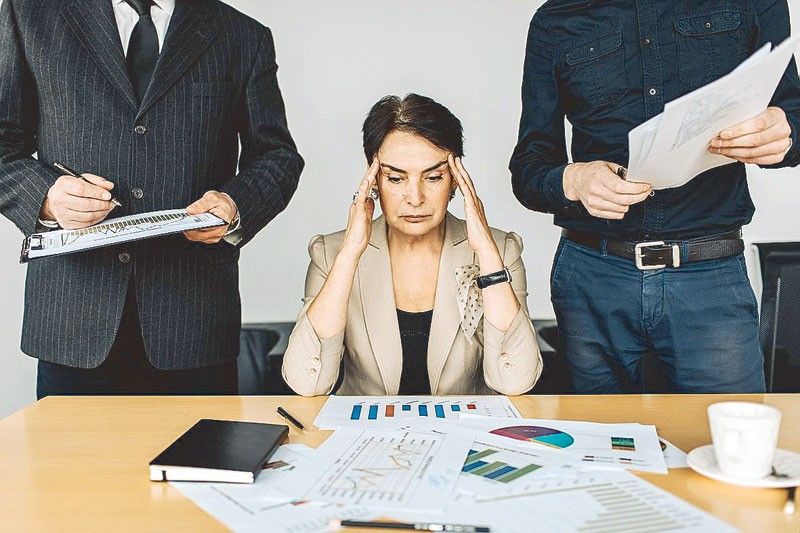Are pinays more stressed than pinoys?

Globally, the month of April is recognized as National Stress Awareness Month. In the course of checking the latest news On the subject, I saw a published study by Divya Periyakoil as Master of Public Health student and a Bloomberg American Health Initiative Fellow at the Johns Hopkins Bloomberg School of Public Health in Baltimore, Maryland.
The study focused on the difference between the levels of stress, depression, and anxiety experienced by men and women in the Philippines during the pandemic. Aside from gender, factors such as age, marital status, household size, parental status, and employment status were considered.
The study revealed that for women, age determined propensity to stress. Women who are older than 35 were found to be significantly less stressed than younger women. The same goes for depression. Those older than 35 were significantly less depressed. The same findings applied to anxiety.
For men, the size of the household was the main determinant of depression. Men who lived in a household with two to five members were 58 percent less depressed than those who live by themselves.
As for the impact of the pandemic on mental health, age was again the determining factor for women, as those 35 years old and above were less affected. For men, determining factors were marital status and healthcare professional status. Married men were 63 percent less likely to be affected than single ones. And obviously, men who were healthcare professionals were 78 percent more likely to be affected than those employed in other industries.
The author said that overall, women reported significantly higher levels of stress, depression, anxiety, and adverse impact of the pandemic. The latter was also linked to the multiple responsibilities of women, including household management, childcare, caregiving to old members of the family, on top of professional tasks.

Stress management is a crucial skill for everyone since it impacts mental and physical wellbeing. We all feel overwhelmed, some more than others. At that point, is it stress or is it already anxiety? What’s the difference?
The National Institute of Health (NIH) defines stress as “the physical or mental response to an external cause, such as having a lot of work or having an illness. A stressor may be a one-time or short-term occurrence, or it can happen repeatedly over a long time.” Stress should go away once the situation gets resolved. NIH also pointed out that stress could have positive or negative results. It can fire you up to meet a deadline or it can cause sleep debt.
Stress and anxiety have the same manifestations: excessive worry, uneasiness, tension, headache, body pain, high blood pressure and loss of sleep. Anxiety happens when the feeling of apprehension doesn’t go away even when the issue that triggered the stress has been resolved. That may eventually lead to anxiety disorder or depression.
So it is really vital to manage your stress. Studies even suggest that up to 80 percent of all hospitalized illnesses are stress-related. While stress exists in everyday life, you have to be aware when it is starting to have negative effects, such as preventing you from doing things you should do or interfering with your daily life.
Awareness to what triggers your stress will help you avoid or limit it. Coping techniques are also personal and may vary from person to person. Try as many activities as possible and note those that work best for you.
You can start a journal. Look into mindfulness activities such as visualization and deep breathing. Exercise regularly. Eat healthy meals. Stick to a sleep routine and get at least eight hours of sleep. Avoid too much caffeinated drinks like coffee, tea and sodas. Connect with friends or family members who help you cope in a positive way.
Before we consider other helpful strategies, it is helpful to note unhealthy coping practices such as substance abuse, self-harm, disordered eating, social media overuse, misdirected anger and simple avoidance.
While there are many strategies to cope with stress, experts have agreed on five major categories. One is problem-focused coping, which means a direct action to solve the problem causing the stress. Second is emotion-focused coping. This includes strategies like relaxation and breathing techniques, as well as creative expression via art, music, writing or dance.
Third is social support. It is interesting to note that women use this strategy more than men, who tend towards avoidance.
Fourth is meaning making, which involves the search for the positive or meaningful aspects of a stressful situation. Two examples of this approach are reframing and journaling. The former is a mindset shift to reassess the situation from being a negative to a positive one.
The last approach is religious coping. Faith can encompass a sense of meaning, social and emotional support. A nature retreat can help ground a person and replace anxiety with awe and gratitude. As they say, “closer to nature, closer to God.” Volunteering is another coping option that falls under this category.
Whether it is you suffering from stress and anxiety or someone close to you, remember that it is always best to seek professional help when things don’t get better. Act soon before it’s too late.

* * *
Post me a note at mylenedayrit@gmail.com.



















